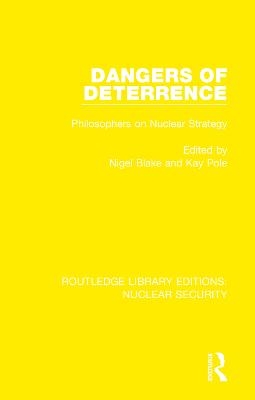
Dangers of Deterrence
Philosophers on Nuclear Strategy
Seiten
2022
Routledge (Verlag)
978-0-367-53521-6 (ISBN)
Routledge (Verlag)
978-0-367-53521-6 (ISBN)
Europe has everything to lose from nuclear war, and nothing to gain from it. Yet it is nuclear deterrence that we are relying on to shield us from war. In this book, originally published in 1983, philosophers go behind the rhetoric of the nuclear debate and analyse the dangers of deterrence.
Europe has everything to lose from nuclear war, and nothing to gain from it. Yet it is nuclear deterrence that we are relying on to shield us from war. More and more people are coming to believe that security under a nuclear shield is an illusion, and that nuclear deterrence embodies a dangerous paradox. It is too close to provocation, it cannot prevent nuclear blackmail, and its short-term success can only lead to proliferation and ultimate instability. In this book, originally published in 1983, philosophers go behind the rhetoric of the nuclear debate and analyse the dangers of deterrence.
The contributors all share a concern about the radical confusions that have arisen concerning nuclear deterrence. Showing how unilateral arguments can be developed from hard-headed political and military considerations, they stress their belief that carefully managed unilateralism is the best method for securing the political independence of Western Europe. The doctrine is not founded on sheer moral idealism. This book will be essential reading for anyone engaged in the public discussion of defence policy.
Europe has everything to lose from nuclear war, and nothing to gain from it. Yet it is nuclear deterrence that we are relying on to shield us from war. More and more people are coming to believe that security under a nuclear shield is an illusion, and that nuclear deterrence embodies a dangerous paradox. It is too close to provocation, it cannot prevent nuclear blackmail, and its short-term success can only lead to proliferation and ultimate instability. In this book, originally published in 1983, philosophers go behind the rhetoric of the nuclear debate and analyse the dangers of deterrence.
The contributors all share a concern about the radical confusions that have arisen concerning nuclear deterrence. Showing how unilateral arguments can be developed from hard-headed political and military considerations, they stress their belief that carefully managed unilateralism is the best method for securing the political independence of Western Europe. The doctrine is not founded on sheer moral idealism. This book will be essential reading for anyone engaged in the public discussion of defence policy.
Nigel Blake, Kay Pole
Acknowledgments. Notes on Contributors. Introduction: A Sceptical Look at the Nuclear Debate Nigel Blake and Kay Pole. Deterrence, Provocation and the Martian Temperament Mary Midgley. Unilateralism: A Clausewitzian Reform? Ken Booth. Nuclear Blackmail Jeff McMahan. Proliferation and the Nature of Deterrence Barrie Paskins. Games Theory and the Nuclear Arms Race Nicholas Measor. Three Main Fallacies in Discussions of Nuclear Weapons W. B. Gallie. Index.
| Erscheinungsdatum | 17.08.2022 |
|---|---|
| Reihe/Serie | Routledge Library Editions: Nuclear Security |
| Verlagsort | London |
| Sprache | englisch |
| Maße | 138 x 216 mm |
| Gewicht | 226 g |
| Themenwelt | Natur / Technik ► Fahrzeuge / Flugzeuge / Schiffe ► Militärfahrzeuge / -flugzeuge / -schiffe |
| Geisteswissenschaften ► Geschichte | |
| Geisteswissenschaften ► Philosophie | |
| Sozialwissenschaften ► Politik / Verwaltung ► Staat / Verwaltung | |
| ISBN-10 | 0-367-53521-1 / 0367535211 |
| ISBN-13 | 978-0-367-53521-6 / 9780367535216 |
| Zustand | Neuware |
| Haben Sie eine Frage zum Produkt? |
Mehr entdecken
aus dem Bereich
aus dem Bereich
von der Machtergreifung bis zur Gründung der Vereinten Nationen
Buch | Softcover (2023)
Motorbuch Verlag
CHF 38,90


